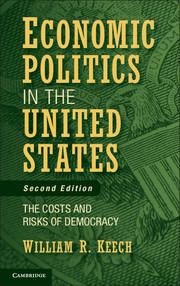Book contents
- Frontmatter
- Contents
- List of Figures and Tables
- Preface to the Second Edition
- Preface to the First Edition
- Part One Introduction
- Part Two Models of Macroeconomic Politics in a Democracy
- Part Three The Sources and Authority of Macroeconomic Goals
- Part Four Institutions and Processes
- Part Five Conclusion
- References
- Index
Part Five - Conclusion
Published online by Cambridge University Press: 05 June 2014
- Frontmatter
- Contents
- List of Figures and Tables
- Preface to the Second Edition
- Preface to the First Edition
- Part One Introduction
- Part Two Models of Macroeconomic Politics in a Democracy
- Part Three The Sources and Authority of Macroeconomic Goals
- Part Four Institutions and Processes
- Part Five Conclusion
- References
- Index
Summary
The first edition of this book spoke of a “deep and fundamental faith in democratic institutions,” based largely on an analysis of political and economic practice in the United States. Recent experience has shaken that faith. I have learned more about democracy in the years since the first edition. It was not previously apparent to me how much the good economic performance of democracy in the United States was contingent on practices that are not part of the definition of democracy.
Since that first edition, the United States has experienced soaring government indebtedness, unintended adverse consequences of an effort to make housing more affordable, and massive moral hazard and time-consistency problems in the financial system. Each of these was permitted or encouraged by the incentives of electoral politics and by limitations on government, the two essential features of democratic institutions. To paraphrase Winston Churchill, American democracy may ultimately do the right things, but it is trying many alternatives before getting to them. And by the time it does them, it may have reduced its own standard of living and position of leadership in the world.
- Type
- Chapter
- Information
- Economic Politics in the United StatesThe Costs and Risks of Democracy, pp. 237 - 238Publisher: Cambridge University PressPrint publication year: 2013



